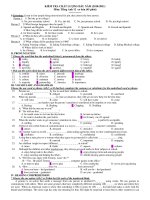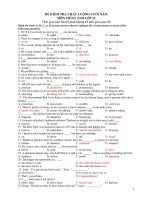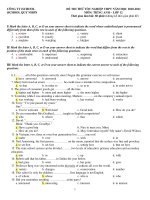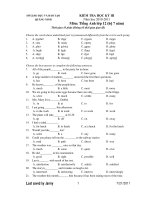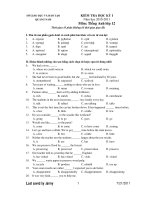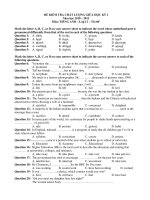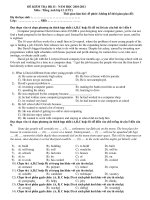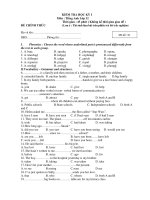KIỂM TRA HỌC KỲ II Năm học 2010-2011 Môn: Tiếng Anh lớp 12 doc
Bạn đang xem bản rút gọn của tài liệu. Xem và tải ngay bản đầy đủ của tài liệu tại đây (108.67 KB, 3 trang )
Last saved by Janny
1 8/25/2011
SỞ GIÁO DỤC VÀ ĐÀO TẠO
THỪA THIÊN HUẾ
KIỂM TRA HỌC KỲ II
Năm học 2010-2011
Môn: Tiếng Anh lớp 12
Thời gian 45 phút (không kể thời gian giao đề)
I. Vocabulary - grammar and structures
Choose the best answer
1. I usually wear skirts but today I______ trousers.
A. wearing B. am wearing C. wear D. wears
2. Preserving natural resources_____ of great importance.
A. is B. are being C. have been D. are
3. He is bored _____ doing the same thing every day.
A. of B. to C. for D. with
4. I worked_____ hard that I felt very tired.
A. such B. too C. enough D. so
5. He said that he _____ his bicycle
A. has lost B. loses C. had lost D. lost
6. I am very_____ in the news.
A. interested B. interesting C. interest D. exciting
7. _____books on this shelf were written by Charles Dickens.
A. All the B. The all C. All D. Every
8. We avoid_____ our environment.
A. polluted B. polluting C. pollute D. to pollute
9. This question is_____ difficult for me.
A. enough B. to C. such D. too
10. She hasn't written to me _____ we met last time.
A. before B. since C. ago D. for
11. He made too_____ mistakes in his writing
A. little B. much C. few D. many
12. They were_____ when they read the result.
A. disappointed B. disappointment C. disappoint D. disappointing
13. There is always_____ traffic in the city centre in the rush-hour
A. full B. heavy C. strong D. big
14. Vehicles also account_____ air pollution in the city.
A. on B. to C. with D. for
15. He said he_____ for five hours
A. has been working B. has worked C. worked D. had been working
Which sentence expresses the same idea as the given one?
16. Peter was too ill to get up
A. Peter was so ill that he couldn't get up B. Peter was very ill for getting up.
C. Peter was not strong enough for getting up D. Peter was not very well to get up
Last saved by Janny
2 8/25/2011
17. This plat is too small for my family
A. This flat is not big enough for my family B. This flat is not rather big for my family
C. This flat is not enough big for my family D. This flat is not very big for my family
18. It has been a long time since they met.
A. They haven’t met for a long time B. They haven’t met since a long time
C. They didn't meet for a long time D. They didn't meet a long time ago
19. Getting a good job doesn't interest him.
A. He isn’t good at getting a good job B. He isn't interested in getting a good job
C. He is good at getting a good job D. He is only interested in getting a good job
20. "Where are you going?" he asked her
A. He asked her where she is going B. He asked her where you were going
C. He asked her where was she going B. He asked her where she was going
II. Phonetics:
Choose the word whose underlined part is pronounced differently from the rest in each group
21. A. odour B. honour C. pour D. vapour
22. A. paint B. reclaim C. drainage D. certain
23. A. different B. taken C. enrich D. element
24. A. possession B. preserve C. conserve D. position
25. A. tolerant B. horrible C. occupied D. reasonable
III. Reading
Read the passages below and choose the correct answer among A, B, C or D.
Every year students from many countries learn English. Some of these students are
young children. Others are teenagers. Many are adults. Some learn at school, others study by
themselves. A few learn English just by hearing the language in film, on television, in the
office or among their friends. But not many are lucky enough to do that. Most people must
work hard to learn another language.
Why do all these people want to learn English? It is difficult to answer that question.
Many boys and girls learn English at school because it is one of their subjects. They study
their own language and mathematics… and English. In England or America, or Australia
many boys and girls study their own language, which is English, and Mathematics,… and
another language, perhaps French, or German or Spanish).
Many adults learn English because it is useful for their work. Teenagers often learn
English for their higher studies because some of their books are in English at college or
university. Other people learn English because they want to read newspaper or magazines in
English.
26. According to the writer
A. English is popular in much of the world B. Only adults learn English
C. English is useful only to teenagers D. No children like learning English
27. Many people learn English by
Last saved by Janny
3 8/25/2011
A. talking with the film stars B. hearing the language in the office
C. watch video only D. working hard on their lessons.
28. In America or in Australia, many schoolchildren study
A. their own language and no foreign language
B. English and Mathematic only
C. such foreign languages as French, German and Spanish.
D. English as a foreign language.
29. Many boys and girls learn English because
A. their parents make them B. they have to study their own language
C. English can give them a job D. It is included in their courses
30. Many adults learn English because
A. Most of their books are in English B. It helps them in their work
C. Their work is useful D. They want to go abroad
There is now increasing concern about the world's energy resources, particularly about
those involving fossil (31)_______ In less than a hundred years we shall probably
(32)_______ all the present (33)_______ of oil and gas. The world's coal (34)_______ should
last longer but, once used, these can not be (35)_______.
It is important, therefore, that we should develop such (36)_______ sources of energy as
solar energy and nuclear energy as well as water and wind (37)_______ (classed as
(38)_______ energy). Until these energy (39)_______ are widely used, it is important for the
developed countries to reduce energy (40)_______ as much as possible
31. A. forms B. powers C. fuels D. energies
32. A. complete B. end C. total D. exhaust
33. A. sources B. productions C. amounts D. findings
34. A. reserves B. mines C. stores D. contents
35. A. repeated B. updated C. produced D. renewed
36. A. surprising B. traditional C. alternative D. revolutionary
37. A. force B. strength C. power D. motion
38. A. renewable B. repeatable C. continual D. continuous
39. A. materials B. supply C. provisions D. goods
40. A. destruction B. exhaustion C. consumption D. waste

